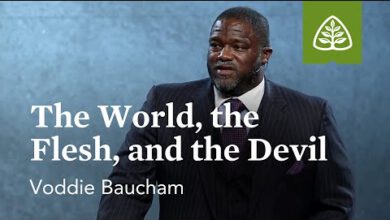Mankind In The World | Voddie Baucham
Mankind In The World | Voddie Baucham
Thank you for joining us today. If you have your Bibles with you, please open them to Genesis 1. I know I’m supposed to wrap up by nine, but I don’t think that’s going to happen.
As you turn to Genesis 1, let me share a story. My family and I have spent the last seven years in Lusaka, Zambia, helping to establish the African Christian University. Early on in our time there—about a year in—we got a dog, a Boerboel.
For those unfamiliar, Boerboels are one of two Southern African breeds originally bred for hunting lions. The term comes from “Boer,” meaning “farmer” in Dutch, making the Boerboel “the farmer’s dog.” These South African mastiffs are large, fearless, and incredibly protective. They will defend their owners against both man and beast, yet they are gentle with children—unless, of course, the child happens to be a lion!
We named our Boerboel Atticus Finch. As a puppy, he needed training, so I worked with him regularly. To help him learn commands in a distracting environment, I took him to an open field near a restaurant across the street from our home. The area had a roundabout, plenty of traffic, and people passing by—perfect for training.
One day, a Zambian man approached me, curious about the dog. “What kind of dog is that?” he asked. I replied, “He’s a Boerboel.” Since this breed is common in the region, I didn’t think much of his question. But he kept pressing, “No, but what kind?”
At first, I didn’t understand what he was really asking. Then, it hit me—he wasn’t asking about the breed; he was wondering how I had a dog that obeyed commands. In Zambia, most dogs aren’t trained. They are locked up during the day and released at night to deter burglars. Many locals fear dogs because they aren’t domesticated like they are in other parts of the world.
This man had been watching me work with Atticus, seeing how he responded to my commands. He was amazed. “I need to get one of those,” he said.
I explained to him that any dog could be trained with the right approach. Then, I shared something deeper—the biblical principle of dominion. In Genesis, God gives humanity authority over the birds of the air and the beasts of the field. Training a dog, I told him, is one small way of exercising that dominion.
As we talked, he became curious about why I was in Zambia. He had noticed my American accent and assumed I had come to train dogs professionally. I explained that in the U.S., dogs serve in the military, work with the police, and assist in all kinds of roles. But I hadn’t come to Zambia for that—I was there to teach theology.
This conversation highlighted one of the challenges I faced in Zambia: explaining the vision of African Christian University. But it wasn’t just a challenge there—it was also difficult back home in the U.S.
Whenever I returned to America for preaching tours, people would ask, “Oh, right! You went to Zambia to start a seminary?” “No,” I’d reply. “Not a seminary.”
“Ah, so you started a Bible college?”
“No, we started a university.”
At that point, I’d often see the same puzzled expression that the Zambian man had when I told him any dog could be trained. Many assumed our mission was solely about ministry training, but it was much more.
